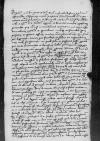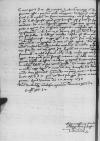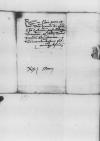Rediens ad nos venerabilis dominus Felix Reich (*ca. 1475 – †1539), secretary to Łukasz Watzenrode, Bishop of Ermland (Warmia), and his chaplain; from 1518 Chancellor to succeeding Bishops of Ermland: Fabian von Lusian (Luzjański) and Mauritius Ferber; 1518-1525 Provost of Guttstadt (Dobre Miasto) Collegiate Chapter; 1526-1539 Canon of Ermland; 1528 Chancellor of the Ermland Chapter; 1529-1532 administrator of the Chapter's estates in Allenstein (Olsztyn), and in 1538 in Tolkemit (Tolkmicko); 1538-1539 Vicar General of the diocese of Ermland, and Custos of Ermland; 1528-1530 envoy of the Ermland Chapter to the Provincial Diet of Royal Prussia (KOPICZKO 2, p. 265-266; BORAWSKA 1984, p. 176-177; SBKW, p. 200-201)⌊FelixFelix Reich (*ca. 1475 – †1539), secretary to Łukasz Watzenrode, Bishop of Ermland (Warmia), and his chaplain; from 1518 Chancellor to succeeding Bishops of Ermland: Fabian von Lusian (Luzjański) and Mauritius Ferber; 1518-1525 Provost of Guttstadt (Dobre Miasto) Collegiate Chapter; 1526-1539 Canon of Ermland; 1528 Chancellor of the Ermland Chapter; 1529-1532 administrator of the Chapter's estates in Allenstein (Olsztyn), and in 1538 in Tolkemit (Tolkmicko); 1538-1539 Vicar General of the diocese of Ermland, and Custos of Ermland; 1528-1530 envoy of the Ermland Chapter to the Provincial Diet of Royal Prussia (KOPICZKO 2, p. 265-266; BORAWSKA 1984, p. 176-177; SBKW, p. 200-201)⌋[1], reddidit mihi a Reverendissima Dominatione Vestra traditum argentum et ducentas marchas exposuitque permulta, quae non nisi meras delicias amoris in me eximiaeque benevolentiae Reverendissimae Dominationis Vestrae spirabant, mihique confirmabant spem perpetuae ac optime cessurae mutuae coniunctionis nostrae. Cui si non pro dignitate, tamen pro facultate et studio ut respondeam, curae mihi semper erit ac quod solum in praesentia possum, gratiam pro tanta humanitate et beneficio habeo quam maximam, utque gratitudinis meae etiam exempla aliquando proferam, connitar.
Quod hunc ad Reverendissimam Dominationem Vestram puerum cum litteris mitto, in causa fuit, quod heri ex Gdańsk (Danzig, Dantiscum), city in northern Poland, on the Bay of Gdańsk at the mouth of the Vistula, on the Baltic, the biggest and wealthiest of the three Great Prussian Cities (Gdańsk, Thorn (Toruń), and Elbing (Elbląg)) with representation in the Council of Royal Prussia; a member of the Hanseatic League⌊GedanoGdańsk (Danzig, Dantiscum), city in northern Poland, on the Bay of Gdańsk at the mouth of the Vistula, on the Baltic, the biggest and wealthiest of the three Great Prussian Cities (Gdańsk, Thorn (Toruń), and Elbing (Elbląg)) with representation in the Council of Royal Prussia; a member of the Hanseatic League⌋ his adiunctae ad Reverendissimam Dominationem Vestram cf. Georg HEGEL to Ioannes DANTISCUS Cr[acow], 1538-03-03, CIDTC IDL 3778⌊litteraecf. Georg HEGEL to Ioannes DANTISCUS Cr[acow], 1538-03-03, CIDTC IDL 3778⌋ ad me superinscribed⌈ad mead me superinscribed⌉ pervenerunt, quae mihi videbantur cuiuspiam ex sodalicio The Fuggers German family of merchants and bankers that dominated European business during the 15th and 16th centuries⌊FucharorumThe Fuggers German family of merchants and bankers that dominated European business during the 15th and 16th centuries⌋ esse. Indeque coniciebam inesse aliquid certi de expeditionibus nostris et diplomatophoro, qui nos hactenus tenet suspensos. Addidi his, quae de rebus novis d ad me sunt perlata, praesertim litteras domini Johann von Werden (Constellatus, cf. HE, No. 148, p. 150, footnote No. 12) (*1495 – †1554), 1526 Mayor of Gdańsk (Danzig), from 1527 Starost of Neuenburg (Nowe), 1532-1535, 1538, 1539, 1546, 1551 Burgrave of Gdańsk, from 1535 Starost of Preußisch Mark (Przezmark) (1535-1540 together with Achatius von Zehmen (Cema)), 1536/1537 envoy of the Council of Royal Prussia to the Diet of the Kingdom of Poland held in Cracow (SBPN 4, p. 433-435; ZDRENKA 2, p. 368-369; MAŁŁEK 1976, p. 93, 161)⌊Ioannis a WerdenJohann von Werden (Constellatus, cf. HE, No. 148, p. 150, footnote No. 12) (*1495 – †1554), 1526 Mayor of Gdańsk (Danzig), from 1527 Starost of Neuenburg (Nowe), 1532-1535, 1538, 1539, 1546, 1551 Burgrave of Gdańsk, from 1535 Starost of Preußisch Mark (Przezmark) (1535-1540 together with Achatius von Zehmen (Cema)), 1536/1537 envoy of the Council of Royal Prussia to the Diet of the Kingdom of Poland held in Cracow (SBPN 4, p. 433-435; ZDRENKA 2, p. 368-369; MAŁŁEK 1976, p. 93, 161)⌋, quae me in maerorem acerbum coniecerunt ob ea, quae de reverendissimo domino Jan Chojeński (*1486 – †1538), 1523 royal secretary, 1526-1537 Grand Secretary; 1531-1535 Bishop of Przemyśl, 1535-1537 Bishop of Płock, 1537-1538 Bishop of Cracow, 1537-1538 Grand Chancellor of the Crown (WYCZAŃSKI 1990, p. 248-249; PSB 3, p. 396-399)⌊Cracoviensi episcopoJan Chojeński (*1486 – †1538), 1523 royal secretary, 1526-1537 Grand Secretary; 1531-1535 Bishop of Przemyśl, 1535-1537 Bishop of Płock, 1537-1538 Bishop of Cracow, 1537-1538 Grand Chancellor of the Crown (WYCZAŃSKI 1990, p. 248-249; PSB 3, p. 396-399)⌋ scribuntur. Quem maximo reipublicae exitio
cf. Verg. A. 9, 696-701 et primum Antiphaten (is enim se primus agebat), / Thebana de matre nothum Sarpedonis alti, / coniecto sternit iaculo: uolat Itala cornus / aëra per tenerum stomachoque infixa sub altum / pectus abit; reddit specus atri uulneris undam / spumantem, et fixo ferrum in pulmone tepescit.; SERV. A. 9, 695 itala cornus telum de Itala cornu factum. et materiam pro opere posuit ⌊Italico telo ictumcf. Verg. A. 9, 696-701 et primum Antiphaten (is enim se primus agebat), / Thebana de matre nothum Sarpedonis alti, / coniecto sternit iaculo: uolat Itala cornus / aëra per tenerum stomachoque infixa sub altum / pectus abit; reddit specus atri uulneris undam / spumantem, et fixo ferrum in pulmone tepescit.; SERV. A. 9, 695 itala cornus telum de Itala cornu factum. et materiam pro opere posuit ⌋
timeo.
Id vero ocius significare volui, ut si paratas haberet Reverendissima Dominatio Vestra litteras, quas ad Jan Chojeński (*1486 – †1538), 1523 royal secretary, 1526-1537 Grand Secretary; 1531-1535 Bishop of Przemyśl, 1535-1537 Bishop of Płock, 1537-1538 Bishop of Cracow, 1537-1538 Grand Chancellor of the Crown (WYCZAŃSKI 1990, p. 248-249; PSB 3, p. 396-399)⌊illumJan Chojeński (*1486 – †1538), 1523 royal secretary, 1526-1537 Grand Secretary; 1531-1535 Bishop of Przemyśl, 1535-1537 Bishop of Płock, 1537-1538 Bishop of Cracow, 1537-1538 Grand Chancellor of the Crown (WYCZAŃSKI 1990, p. 248-249; PSB 3, p. 396-399)⌋ vel ad Sigismund I Jagiellon (Zygmunt I) (*1467 – †1548), King of Poland and Grand Duke of Lithuania (1506-1548); Duke of Głogów (Glogau) (1499-1506), Duke of Opava (1501-1506), Governor of Silesia (1504-1506); son of King Kazimierz IV Jagiellon and Elisabeth of Austria⌊principemSigismund I Jagiellon (Zygmunt I) (*1467 – †1548), King of Poland and Grand Duke of Lithuania (1506-1548); Duke of Głogów (Glogau) (1499-1506), Duke of Opava (1501-1506), Governor of Silesia (1504-1506); son of King Kazimierz IV Jagiellon and Elisabeth of Austria⌋ mitteret (id quod dominus Felix Reich (*ca. 1475 – †1539), secretary to Łukasz Watzenrode, Bishop of Ermland (Warmia), and his chaplain; from 1518 Chancellor to succeeding Bishops of Ermland: Fabian von Lusian (Luzjański) and Mauritius Ferber; 1518-1525 Provost of Guttstadt (Dobre Miasto) Collegiate Chapter; 1526-1539 Canon of Ermland; 1528 Chancellor of the Ermland Chapter; 1529-1532 administrator of the Chapter's estates in Allenstein (Olsztyn), and in 1538 in Tolkemit (Tolkmicko); 1538-1539 Vicar General of the diocese of Ermland, and Custos of Ermland; 1528-1530 envoy of the Ermland Chapter to the Provincial Diet of Royal Prussia (KOPICZKO 2, p. 265-266; BORAWSKA 1984, p. 176-177; SBKW, p. 200-201)⌊FelixFelix Reich (*ca. 1475 – †1539), secretary to Łukasz Watzenrode, Bishop of Ermland (Warmia), and his chaplain; from 1518 Chancellor to succeeding Bishops of Ermland: Fabian von Lusian (Luzjański) and Mauritius Ferber; 1518-1525 Provost of Guttstadt (Dobre Miasto) Collegiate Chapter; 1526-1539 Canon of Ermland; 1528 Chancellor of the Ermland Chapter; 1529-1532 administrator of the Chapter's estates in Allenstein (Olsztyn), and in 1538 in Tolkemit (Tolkmicko); 1538-1539 Vicar General of the diocese of Ermland, and Custos of Ermland; 1528-1530 envoy of the Ermland Chapter to the Provincial Diet of Royal Prussia (KOPICZKO 2, p. 265-266; BORAWSKA 1984, p. 176-177; SBKW, p. 200-201)⌋ indicabat), contineret paulisper, dum de eventu illius casus fieret certior. Id vero, qualecumque sit, cupio me quoque edoceri in Jan Chojeński (*1486 – †1538), 1523 royal secretary, 1526-1537 Grand Secretary; 1531-1535 Bishop of Przemyśl, 1535-1537 Bishop of Płock, 1537-1538 Bishop of Cracow, 1537-1538 Grand Chancellor of the Crown (WYCZAŃSKI 1990, p. 248-249; PSB 3, p. 396-399)⌊viri huiusJan Chojeński (*1486 – †1538), 1523 royal secretary, 1526-1537 Grand Secretary; 1531-1535 Bishop of Przemyśl, 1535-1537 Bishop of Płock, 1537-1538 Bishop of Cracow, 1537-1538 Grand Chancellor of the Crown (WYCZAŃSKI 1990, p. 248-249; PSB 3, p. 396-399)⌋ veneratione non parum accensum. Doctor Ioannes Tresler (Dreszler) (†after 1548), born in Gdańsk, from 1509 studied at Leipzig and Bologna; promoted to doctor of medicine and canon law. In 1538 he made ineffective efforts to obtain a canonry of Ermland, then moved to Wrocław; maintained close contact with Nicolaus Copernicus; from 1519 Canon of the Collegiate Chapter in Wrocław (Breslau), and from 1523 its Custos; 1530-1538 town physician and syndic in Gdańsk (Danzig) (SCHWARZ 1939, p. 29; DREWNOWSKI 1978, p. 49, 104, 138, 211; BORAWSKA 2013, p. 319-320)⌊Ioannes TreslerusIoannes Tresler (Dreszler) (†after 1548), born in Gdańsk, from 1509 studied at Leipzig and Bologna; promoted to doctor of medicine and canon law. In 1538 he made ineffective efforts to obtain a canonry of Ermland, then moved to Wrocław; maintained close contact with Nicolaus Copernicus; from 1519 Canon of the Collegiate Chapter in Wrocław (Breslau), and from 1523 its Custos; 1530-1538 town physician and syndic in Gdańsk (Danzig) (SCHWARZ 1939, p. 29; DREWNOWSKI 1978, p. 49, 104, 138, 211; BORAWSKA 2013, p. 319-320)⌋, quem a Gdańsk Town Council ⌊GedanensibusGdańsk Town Council ⌋ ad Reverendissimam Dominationem Vestram legatum ivisse audio, certius fortasse aliquid de his et aliis nuntiavit. Hans Brask (Ioannes Brask) (*1464 – †1538), The last Catholic bishop of Linköping (1513-1527), doctor of canon law, follower of and advisor to King Gustav Vasa of Sweden. In 1527, after the Diet in Västerås had made the decision to introduce the Reformation in Sweden, Brask went into exile to Poland, where he spent the rest of his life (CHAMARCZUK, passim)⌊Episcopo LincopensiHans Brask (Ioannes Brask) (*1464 – †1538), The last Catholic bishop of Linköping (1513-1527), doctor of canon law, follower of and advisor to King Gustav Vasa of Sweden. In 1527, after the Diet in Västerås had made the decision to introduce the Reformation in Sweden, Brask went into exile to Poland, where he spent the rest of his life (CHAMARCZUK, passim)⌋, qui Gdańsk (Danzig, Dantiscum), city in northern Poland, on the Bay of Gdańsk at the mouth of the Vistula, on the Baltic, the biggest and wealthiest of the three Great Prussian Cities (Gdańsk, Thorn (Toruń), and Elbing (Elbląg)) with representation in the Council of Royal Prussia; a member of the Hanseatic League⌊GedaniGdańsk (Danzig, Dantiscum), city in northern Poland, on the Bay of Gdańsk at the mouth of the Vistula, on the Baltic, the biggest and wealthiest of the three Great Prussian Cities (Gdańsk, Thorn (Toruń), and Elbing (Elbląg)) with representation in the Council of Royal Prussia; a member of the Hanseatic League⌋ exulat, e Rome (Roma), city in central Italy, on the Tiber river, seat of the Holy See⌊RomaRome (Roma), city in central Italy, on the Tiber river, seat of the Holy See⌋ scriptum est Paul III (Alessandro Farnese) (*1468 – †1549), 1493 elevated to cardinal; 1524 Cardinal-Bishop of Ostia; 1534-1549 Pope⌊Paulum papamPaul III (Alessandro Farnese) (*1468 – †1549), 1493 elevated to cardinal; 1524 Cardinal-Bishop of Ostia; 1534-1549 Pope⌋ ob gravem senectutem infantiscere ac a moderatione rerum amotum esse. Et adhuc molimur Universal Council of Roman Catholic Church ⌊conciliumUniversal Council of Roman Catholic Church ⌋ fortasse ad redigendum Paul III (Alessandro Farnese) (*1468 – †1549), 1493 elevated to cardinal; 1524 Cardinal-Bishop of Ostia; 1534-1549 Pope⌊illumPaul III (Alessandro Farnese) (*1468 – †1549), 1493 elevated to cardinal; 1524 Cardinal-Bishop of Ostia; 1534-1549 Pope⌋ in ordinem et cedendum alteri locum.
De custodia, quod Reverendissima Dominatio Vestra cf. Ioannes DANTISCUS to Tiedemann GIESE shortly before 1538-03-20, CIDTC IDL 7165, letter lost⌊scribitcf. Ioannes DANTISCUS to Tiedemann GIESE shortly before 1538-03-20, CIDTC IDL 7165, letter lost⌋, quamvis mihi sit optatissimum, tum visum est mihi non in loco nunc agi posse apud dominum Johann Tymmermann (Johann Zimmermann) (*1492 – †1564), nephew of Mauritius Ferber, Bishop of Ermland; studied in Cracow (1505) and in Rome (1517); 1519-1564 Canon of Ermland (Warmia); 1525-1528 administrator of the Chapter's estates in Allenstein (Olsztyn) and in 1538 in Frauenburg (Frombork); 1527-1539 Cantor of Ermland; 1537 General Administrator of the bishopric of Ermland (after Mauritius Ferber's death); 1539-1552 Custos of Ermland; 1547-1552 General Vicar of the diocese of Ermland (SBKW, p. 261; KOPICZKO 2, p. 336)⌊cantoremJohann Tymmermann (Johann Zimmermann) (*1492 – †1564), nephew of Mauritius Ferber, Bishop of Ermland; studied in Cracow (1505) and in Rome (1517); 1519-1564 Canon of Ermland (Warmia); 1525-1528 administrator of the Chapter's estates in Allenstein (Olsztyn) and in 1538 in Frauenburg (Frombork); 1527-1539 Cantor of Ermland; 1537 General Administrator of the bishopric of Ermland (after Mauritius Ferber's death); 1539-1552 Custos of Ermland; 1547-1552 General Vicar of the diocese of Ermland (SBKW, p. 261; KOPICZKO 2, p. 336)⌋, indubie suspensurum sententiam, usque dum intelligat eventum expeditionis meae, praesertim in custodiae retentione. Video enim hac cura obsessum inde omnia speculari, haec igitur nobis quoque opportunitas videtur exspectanda, quo melius agendorum rationes instituere simulque conficere omnia possimus. Si tamen diversum videtur Reverendissimae Dominationi Vestrae, libenter parebo iussis.
 AAWO, AB, D. 2, f. 85v
AAWO, AB, D. 2, f. 85v
cook of Ioannes DANTISCUS ⌊Cocuscook of Ioannes DANTISCUS ⌋ Reverendissimae Domanationis Vestrae ille maritus Löbau (Lubawa, Lubavia), town in northern Poland, Kulm Land (Ziemia Chełmińska), ca. 67 km E of Graudenz (Grudziądz), the main seat of the bishops of Kulm (Chełmno)⌊LobaviamLöbau (Lubawa, Lubavia), town in northern Poland, Kulm Land (Ziemia Chełmińska), ca. 67 km E of Graudenz (Grudziądz), the main seat of the bishops of Kulm (Chełmno)⌋ venerat, cum ibi meus hidden by binding⌈[s]s hidden by binding⌉ servitor esset, per hunc mihi nuntiavit locaturum se mihi operas hidden by binding⌈[s]s hidden by binding⌉ suas, si id cuperem ac brevi renuntiarem. Nam si respuerem, iturum hidden by binding⌈[um]um hidden by binding⌉ se ad Citizens of Elbing ⌊ElbingensesCitizens of Elbing ⌋, apud quos honesta ipsi s data sit stipendii hidden by binding⌈[ii]ii hidden by binding⌉ condicio. Ita a me responsum exspectat. Ego vero ignarus quo hidden by binding⌈[o]o hidden by binding⌉ pacto a Reverendissima Dominatione Vestra missionem acceperit inconsulta ipsa nihil constituendum mihi hac in re decrevi. Scio enim, hominum hoc genus quam sit fallax. Si Elbing (Elbląg), city in northern Poland, Pomerania, on the Vistula Lagoon, one of the three Great Prussian Cities (beside Gdańsk (Danzig) and Thorn (Toruń)) which had representatives in the Prussian Council; member of the Hanseatic League⌊ElbingumElbing (Elbląg), city in northern Poland, Pomerania, on the Vistula Lagoon, one of the three Great Prussian Cities (beside Gdańsk (Danzig) and Thorn (Toruń)) which had representatives in the Prussian Council; member of the Hanseatic League⌋ concedet, consilium est illinc petere eum, cui successurus est. Rogo igitur, Dominatio Vestra Reverendissima suam mihi voluntatem indicet ac ignoscat de cocis cum ipsa agenti. Dominus Paweł Płotowski (*ca. 1485 – †1547), in 1523, after the death of Fabian von Lusian (Luzjański), Płotowski was one of the King's four candidates for the post of the bishop of Ermland; in 1530 and 1537, after the death of Jan Konopacki (Johann von Konopat) Sr and Dantiscus' transfer to the bishopric of Ermland, he made an effort to obtain the dignity of bishop of Kulm; from 1522 Provost of the Ermland (Warmia) Chapter, and from 1523 Canon of Ermland; secretary to Crown Grand Chancellor Krzysztof Szydłowiecki, and from 1533 royal secretary and courtier; in the thirties and forties several times royal envoy to the Royal Prussian Estates (SBKW, p. 191; KOPICZKO 2, p. 249-250)⌊praepositusPaweł Płotowski (*ca. 1485 – †1547), in 1523, after the death of Fabian von Lusian (Luzjański), Płotowski was one of the King's four candidates for the post of the bishop of Ermland; in 1530 and 1537, after the death of Jan Konopacki (Johann von Konopat) Sr and Dantiscus' transfer to the bishopric of Ermland, he made an effort to obtain the dignity of bishop of Kulm; from 1522 Provost of the Ermland (Warmia) Chapter, and from 1523 Canon of Ermland; secretary to Crown Grand Chancellor Krzysztof Szydłowiecki, and from 1533 royal secretary and courtier; in the thirties and forties several times royal envoy to the Royal Prussian Estates (SBKW, p. 191; KOPICZKO 2, p. 249-250)⌋ videtur multas hic nobis turbas moturus ac moliri quaedam vix ferenda, etiam Vestrae Reverendissimae Dominationi. Aequum erit mature compescere ferocientem et nihil deferentem ecclesiae iuribus, modo ipse rem suam agat. Mea quidem parum fortasse intererit, tamen dolet tam nulla fronte discedi ab officio et induci inexpertam hactenus servitutem in ecclesiam liberam et suo utentem praeside. Cum mittet Reverendissima Dominatio Vestra in aulam, rogo, dignetur et meas ad dominum Wojciech Kijewski (Wojciech Kijowski, Wojciech Kilewski, Albert Kijowski) (*ca. 1495 – †1566), from 1518 scribe in the royal chancellery; 1531-1535 secretary to Vice-Chancellor Piotr Tomicki; from 1532 Dean of the Collegiate Chapter in Sącz; from 1523 Canon of Kulm (Chełmno); from 1532 Canon of Ermland (Warmia); from 1533 Canon of Włocławek; from 1547 Canon of Cracow; representative of the Ermland Church at the royal court (KOPICZKO 2, p. 147; SBKW, p. 112-113)⌊KiewskiWojciech Kijewski (Wojciech Kijowski, Wojciech Kilewski, Albert Kijowski) (*ca. 1495 – †1566), from 1518 scribe in the royal chancellery; 1531-1535 secretary to Vice-Chancellor Piotr Tomicki; from 1532 Dean of the Collegiate Chapter in Sącz; from 1523 Canon of Kulm (Chełmno); from 1532 Canon of Ermland (Warmia); from 1533 Canon of Włocławek; from 1547 Canon of Cracow; representative of the Ermland Church at the royal court (KOPICZKO 2, p. 147; SBKW, p. 112-113)⌋ his adiunctas nuntio dare perferendas.
Commendo me paterno amori et benevolentiae Reverendissimae Dominationis Vestrae, quam ut Deus sua gratia servet et tueatur, precor.



 AAWO, AB, D. 2, f. 85av
AAWO, AB, D. 2, f. 85av